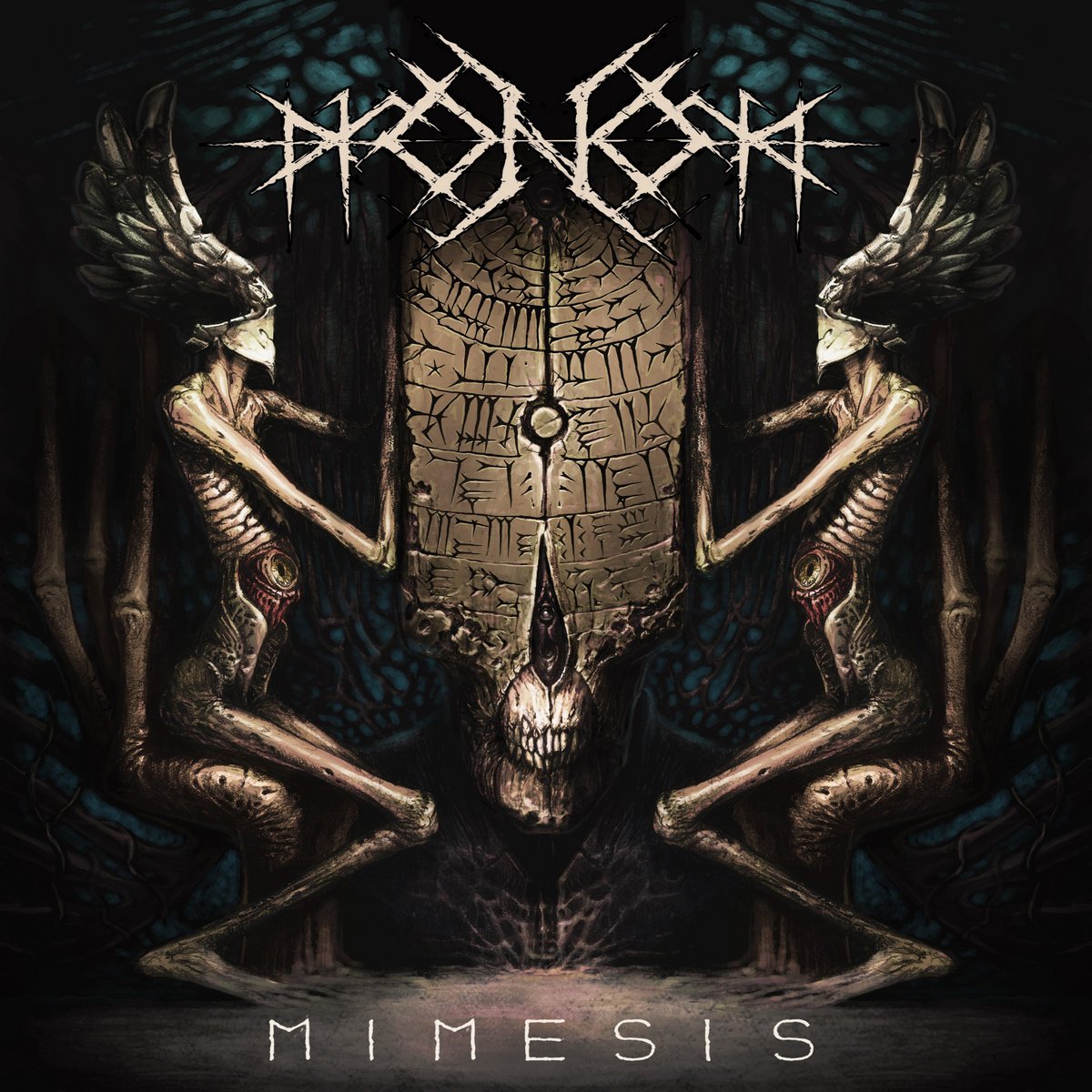Never have I stopped telling everyone that I was, and still am, a frequent reader of this blog, even before joining the team. Everything Is Noise became my regular go-to webpage for music discovery after nailing a bunch of recommendations included on reviews and other features. Whenever I read a recently released WFA feature, I reckoned on having the chance of sharing, sometimes, bands I love, and that I wish they had more exposure. Now, five months after becoming a writer for EIN, I have the opportunity. So, I will make it worth your time. Welcome to another edition of our very own Weekly Featured Artist. The band in question today is Pronoia, from Argentina — my dear home country.
The following paragraphs provide context on Pronoia’s interview. If you are short on time, you can skip this section and go directly to the band’s introduction following the next video. Anyway, I sincerely encourage you to make a full read if you want to have the complete set.
Aside from being the land of choripanes and rampant inflation, us, Argies, have managed to put out many incredible, decent, and forgettable acts over the years. Many of them are known to people from overseas, though most of them never transcend our borders. Considering that most of our audience resides outside South America, it is absolutely understandable to never have crossed paths with any of our bands. However, many times, when speaking to people from the United States or the UK, it is complicated to describe how hegemonic their musical output has been in my country, and in the world, for that matter.
In economic terms, we could say that we are net importers of music if we look at the big picture. However, it’s not linear across styles and geographies: Folklore will forever remain untouched, Trap has gained a lot of traction, and rock scenes are still strong. Even then, popular radio stations and streaming services’ playlists gravitate towards international acts most part of the time. What’s more, our constant instability jeopardizes career development across all areas, especially cultural ones. These effects contribute to what I would define as the ‘local complex’. Picture this as self-designed goggles through which many people, myself included, unconsciously consume and judge music — could apply to any kind of art, or anything really. The complex basically works by undermining the art’s quality only based upon the artist’s origin. Is it from abroad? Great, then. Is it local? Hell no, then. That’s it.
Why am I going through so much trouble telling you guys this? Well, on the one hand, to explain that whenever a local act gets recognized from the outside world, we celebrate like crazy, since it means the local artist has managed to make itself a name among all the sea of content emanating from abroad. Yet, on the other hand, to confess that we might sometimes neglect our own scene, just because it’s ours, not because it’s bad.
This piece of insight is quite necessary when presenting these guys since the local complex has been around pretty heavy in the Argentinean metal scene. Hopefully, you will find its relationship to Pronoia’s comments. Let’s introduce them.
This band can be undoubtedly considered the most prominent modern metal act in Argentina’s scene. Although they have had different phases and line-ups — actually, they’ve been around for seventeen years now — the band has established its definitive path with their latest album: Mimesis. Full of moody chugs, impressive bass lines, and tight drum patterns, Pronoia built a sound of its own for our national standards, in my opinion. I will not delve much on their lineup history since the interview features a detailed explanation on the band’s evolution given by the band itself. These are a bunch of guys that started early on their lives with musical endeavors, playing as many bands and genres they could. Pronoia is the place where they all synthesize their wisdom and progress acquired from the past. Though, always learning new stuff, the band delivered a mature record that feels like a new debut which, in a way, really is. Keeping blasting these tracks while reading, I’m watching you!
I had the pleasure to speak with Bruno Tysak Fichera, their outstanding bass player. He brought me up to speed on the band’s history and their individual musical background. I originally discovered this band through their founding member, Chowy Fernandez’s YouTube channel. A fellow bandmate told me to watch this guy shred and, man does he shred! Easily stunned by his guitar work, we kinda followed the guy’s career ever since. Actually, we met him as a regular attendee in must-go concerts like The Aristocrats and Monuments. By the time Mimesis came out, we were mind-blown. Even then, we had already assumed that something good was about to drop due to Chowy’s amazing capabilities. When I blasted “Fulgor” for the first time, I knew this was something else.
This interview reflects the endurance and maturity of a band that has gone through many stages. No surprise they deliver magnificent proficiency in Mimesis, they’ve been around long enough to get their chops tight. Nevertheless, you will see this interview touches deeper concepts, not strictly musical. In a way, I expected this interview to take this tone, but not with the clarity and down-to-earthiness from which they addressed the questions. Revisiting it is a truly humbling and mind-opening experience. I hope that you enjoy it as I did. Ladies and gentlemen, Pronoia.
Everything Is Noise: What was the motivation to start Pronoia? There is nothing in Argentina that sounds like you.
Bruno: Our motivation is similar to those of whomever wants to start a band in a country like ours. It’s love for the art, 100% of the time. Having a band that makes this style of music is not profitable, nor does it bring any substantial financial reward to be a palpable motivation. The only factor that triggers and perpetuates the band to this day after so long is that we love art in all its forms. We love our instrument, and we love making music.
EIN: Pronoia is an instrumental band. Was that decided from early on, or was it something that happened naturally with the passage of time? I could not conceive it in any other form that what it is now.
B: Absolutely not, and it’s a bit of a long story. Originally, the band was set to be a power trio, with a singer. The style was totally different, the compositional approach, sound, climate, and even the aesthetics of the band were a completely world apart from what it is today. We can all agree that Pronoia today is basically another band compared to what it was at the beginning.
The only original member is Chowy, who founded Pronoia together with the first vocalist. Over the years, the band has had many line-up changes. It could be said that Pronoia had three main stages or periods:
First period started at the band’s birth in early 2003, 2004. The band, then, consisted of Chowy, Valentín Martinez, Germán Mora and David Tomaselli. That period culminated after two of three years approximately after the release of the first album, Siniestresia in 2008. By that time, the band had already suffered line-up changes and found itself stuck. In this following period, there were so many comings and goings of new members, that the focus of the band ended up being more that of not collapsing, and trying to find stability, than really concentrating on making music. We played live, sporadically. But always the same songs from the first album, with an occasional glimpse of a new song. Those new ideas never grew into something precise given there was no solidity in terms of the people involved in the creative process. Eventually, this issue altered and quarantining the process itself.
Finally, we found a way to keep a fairly stable line-up and finish writing what today is part of the Mimesis record. Not without more problems, though. Mimesis was originally meant to have vocal tracks on it. Very late into the process, we parted ways with our singer and finally made the decision to stop blindly pursuing a non-existent ideal vocalist and transform into an exclusively instrumental band. This, however, had been already spinning in our heads for some time. Therefore, making the record instrumental as a whole, was a collateral damage of releasing our vocalist, so we had to make a few adjustments.
From that point onwards, we only had one last change. We introduced Javier Cuello as our new drummer. We can say that this is Pronoia’s most stable, focused, and determined line-up the band ever had.
EIN: How would you describe the band to someone who doesn’t know you? What can the audience expect?
B: Self-description, I think, is somewhat complicated. In a nutshell, I think we just do instrumental metal, but we try to give it a modern twist.
EIN: What are your main influences? Tech-death is blasted in full swing at home, right? What about non-metal influences?
B: All of us have very similar tastes, with preferences that vary and branch out … What I can say is that, ironically, the music we listen to the most is not usually metal. What we consume the most is usually fusion music. Obviously, we have the ‘metal’ genre built in by default; it is the music we grew up with. Speaking of personal searches, I think we agree that there is very little that we leave out when we listen to music. We have a lot of respect for all styles, and we believe that in all of them there is something remarkable and from which to learn. I think that as musicians, it is our responsibility to have an open mind about it, and to nourish ourselves with all kinds of music, to, eventually, be versatile when thinking and making our own.
EIN: Mimesis is an album that irradiates with quality, musicality and skill. How long did it take you to write and record this album? In a nutshell, what is the typical songwriting process for Pronoia? The songs are highly elaborate. Though it is an album in which all the instruments shine, it is definitely a riff factory.
B: Mimesis, as I said before, was written throughout the last years of the band’s ‘status quo’ stage. It ended up being a collateral damage for all the disorganization and conflict that existed internally. The songwriting process at that time was completely unstructured. It was something that turned out well exclusively due to our passion and desire to carry the project. Those who survived that period were Chowy, Gabbo, and myself… Now that the band is in a new stage of stability and determination, the songwriting process is much more collaborative than before.
EIN: Your Bandcamp page states that you guys recorded the album on your own. How important is it to be able to achieve your musical vision without relying on others?
B: Pronoia has always been a band of friends. And, therefore, it’s always been independent. We do not know any other way to make music, than to try to carry out our vision, however complex and difficult that path may be sometimes. Without insinuating that there’s an only correct way to specify it, I don’t think that a band like ours could thrive if it had to depend on the vision of a third party, since our project has always been something very personal, both as a band, and individually for each one of us. If it wasn’t like this, the band, and our music, would be completely truncated.
EIN: I remember watching you guys open for Periphery in 2019. I think it was one of your first live shows with the current lineup. You kicked ass. I believe that the crowd acknowledged that they were facing the start of a new scene in Argentinean metal. What do you think of the local and international metal scene? Is it time to modernize?
B: There are many local bands and musicians of an extraordinary level. Many of them, extremely well known, and some not so much with equal or more potential than anyone, nonetheless. It seems to me that the idea of ’modernization’ can be widespread, but even so, it is something that is determined by socioeconomic factors that our country faces over time. It’s an extremely complex and extensive subject on which it would be mischievous to make any reductionisms. In my opinion, there is a combination between the typical old school idealism of what an Argentine metal band should be – and the environment in which it dwells – and the paradigm of international metal that is basically gestated in the first world – where the economic situation is extremely different to ours. It is very difficult to import and incorporate certain concepts of what could be done at an artistic and logistical level with modern metal when those concepts come from places where, at the end of the month, you can invest in a new instrument or piece of gear; because there’s still money in your pocket. Here, it may take a year or more of full- time work. These are complicated issues, but even so, it seems to me that everything is well under way due to the fact that technology and communication advance despite adversities, and that kind of things inevitably update and become more sophisticated over time.
EIN: The majority of Everything Is Noise’s audience is logically unaware of Argentina’s metal scene. That being said, I believe that Pronoia is the first band which has that ‘export’ quality required to access international scenes. Did you receive any feedback from abroad? How far from now can you imagine Pronoia making an international tour? (Covid aside, of course)
B: To begin with, we know for sure that we are not the first export quality band – although we are not quite sure what that really means either. The repercussion that we may have had abroad is the result of communication’s accessibility and artistic diffusion provided by social networks, which is the same for any musician that generates quality content. Even so, I believe that there is a clear mystification of what ‘abroad’ means. In connection with what I said before about the disparity among countries, I do not think that what comes from abroad is ‘better’ and that therefore it is necessary to be ‘worthy’ to export music. It sounds like what is outside has more value than what we have here just because it is from abroad. It seems to me that the fact is simply that abroad, and especially in the first world countries, there are much more resources and economic facilities to have better musical education, acquire better work tools, and as a consequence that there are more people capable of generating quality content.
EIN: What can we expect from Pronoia in the future? Mimesis came out in 2018… I get the idea that there must be new material coming together. Yet, writing songs with such complexity should not be an easy task at all.
B: Things getting cooked, for sure. Obviously, plans were truncated by the pandemic, but even so we are still eager to make music, and that is what we have been doing a bit in secret. We are still testing the potential and capacity of this new line-up. In this process we are writing new music, which, hopefully, will be released in a not-too-distant future. I do not want to say much more about it, because there are not many certainties to this, but if there is one, it’s that there’s Pronoia for a little longer.
Pronoia is…
Chowy Fernandez – Guitar
Gabbo Puente – Guitar
Bruno Tysak Fichera – Bass
Javier Cuello – Drums
Check Pronoia‘s Facebook and Instagram pages for updates. Here’s their Bandcamp page, too! Be sure to give these guys a follow… even the Old Composer guy got thrilled to hear them!







